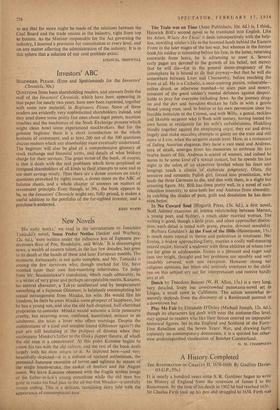. New Novels.
'His early works,' we read in the introduction to Junichiro Tanizaki's novel, Some Prefer Nettles (Seeker and Warburg, 12s. 6c1.), `were written under the influence less of Japanese pre- decessors than of Poe, Baudelaire, and Wilde.' It is discouraging news; a wealth of eastern talent, in the last few decades, has gone to its death at the hands of these and later European models. The . massacre, fortunately, is not quite complete, and Mr. Tanizaki is among the few survivors who, though marked for life, have recoiled upon their own fast-vanishing inheritance. To judge from Mr. Seudensticker's translation, Which reads admirably, he is a writer of very great and perhaps unrepeatable merits. Kaname, his central character, a Tokyo intellectual and by temperament something of a Japanese Oblomov, is helplessly contemplating his sexual estrangement from Misako, his wife. He would like his freedom, he feels he owes Misako some prospectof happiness, but he has a young son, and also the old half-despised, half-cherished proprieties to consider. Misako would welcome a little possessive cruelty, but receiving none, confused, humiliated, miscast as an adulteress, she takes a lover who offers marriage. Despite the ministrations of a kind and sensible friend (Oblomov again?) the pair are still hesitating at the prospect of divorce when they accompany Misako's father to the Osaka puppet theatre, of which the old man is a connoisseur. At this point Kaname begins to renew his tics with the old culture, and the rest of the book deals largely with, his slow return to it. As depicted here—and very beautifully depicted—it is a culture of toyland aestheticism, the perennial Japanese exorcism of terror and ugliness by means of the single brush-stroke, the casket of fireflies and the August moon. We leave Kaname obsessed with the fragile sexless image of his father-in-law's young concubine while the old man has gone to make his final plea to the all-but-lost Misako—a carefully muted ending. This is a delicate, tantalising story told With the appearance.of contemptuous ease. The Train was on Time (Arco Publishers, 10s. 6d.) is, I think, Heinrich. Boll's second novel to be translated into English. Like his Adam, Where Art Thole it deals introspectively with the help- less, unwilling soldier's life in the haunted lands behind the Eastern Front in the later stages of the last war, but whereas in the former book his soldier is retreating before his fate, in the latter, returning eastwards from leave, he is advancing to meet it. Several early pages are devoted to the growth of his belief, not merely that he will die—for. in the general doom:pregnancy of the atmosphere he is 'bound to dO that anyway—but that he will die somewhere between LVov and Chernovtsy, before reaching the front at ail. He is a CathOlic; a once-aspiring pianist, vulnerable— unless drunk or otherwise numbed—•to alien pain and misery. innocent of the good soldier's mental defences against despair. liable to pray for everyone .including Jews. As the journey drags on and the dirt and boredom 'thicken he falls in with a gentle blond young man, sunk in horror at his own perversion since his forcible initiation in Crimea, and with Willy, a genial, reckless and likeable sergeant whO is 'flush with Money, having looted his own home in retaliation fOr his wite'S unfaithfulness. Huddling blindly together. against the .enveloping angst, they eat and drink hugely and make macabre tittenipts at gaiety on the train and still more at Lvov, when the sergeant stands treat. Here, at a restaurant of fading Austrian elegance; they have a vast meal and Andreas, sure, of death, 'emerges, from his. memories to embrace his last twelve hours of life. Andreas is scared of women, and indeed he seems to be some kind ofa sexual outcast, but he spends his last night in the salon of an expenSive brothel where his fears and longings reach a climax 'of, elaborate poignancy. Olina, the sensitive and romantic Polish girl, forced into prostitution, who leads the three Germans to die, and 'dies with them, is a slight but arresting figure. Mr. Boll has done pretty well, in a novel of such relentless intensity, to save.both her and Andreas from absurdity. In catching the shades of 'pain, guilt and desolation he has done
even better. •
In. No Cowards Soul (Hogarth Press, 13s. 6d.), a first novel, Noel Adeney examines an. intense relationship between 'Merton, a young poet, and: Sydney, a much. older married woman. The ' writing'is.good, though a' little prim, and often approaches 'distinc- tion; each detail is noted with grave, precise, devoted sensibility.
Barbara Goulden's At .the Foot.of the Hills (Heinemann, 15s.) is much more topical in theme and pedestrian in treatment. Her , Emma, a widow approaching forty, marries a cosily well-meaning retired major, himself a• widower with three children of whom two are far gone in adolescence. Emma is a pleasant and eager soul (not too bright, though) and her problems are sensibly and very readably covered, with one exception. However strong her religious opinions, her blunt and untimely overtures to the child- ren on this subject cry out for interpretation and receive hardly any at all. .
Dutch by Theodore Bonnet (W.. H. Allen, 15s.) is a very long,
very detailed, lively but overcrowded panorama-novel set in Llagas, a small • town in California. The action somewhat in- . securely depends from the discovery of a Rembrandt portrait in a downtown bar.
Play ,Me Fair:by, Elizabeth. D'Oyley ,(Michael Joseph, 12s. 6d.), though its characters are dealt with 'near the costume-film level, may appeal to readers who like 'their fiction centred on unpopular historical figures. Set in the England and ,Scbtland of the Forty- Five Rebellion and the Seven Years' War, and drawing fairly copiously On contemporary documents, it is a spirited but other- wise undistinguished vindication of Butcher Cumberland.
H. M. CHAMPNESS


































 Previous page
Previous page